Urban
Alliance
2019-2020
Annual report
Dear Friends,
In living memory, there has never been a year quite like 2020: a global pandemic, a global movement for racial justice, and a redefinition of work and home on a worldwide scale.
It was a year defined by shocking statistics: more than 300,000 lives have been lost and thousands of communities have been ravaged. Millions of Americans were forced into social isolation – nearly 2/3 were working from home. Schools, gathering places and businesses shut their doors – an estimated 100,000 businesses closing for good. At the height of the first COVID wave, 22 million jobs were lost. Then, in June, millions of Americans took to the streets following the death of George Floyd, as the country was rocked by a much overdue racial reckoning and push for justice after centuries of systemic racism.
Yet at a time when we were more physically distant than ever, we were living through a shared experience on an unprecedented scale, experiencing a new normal – together. Through social media, through Zoom, through videos, we connected on a deeper level, we commiserated, and we shared our experiences. We went beyond the statistics to the stories and humans behind them.
That same spirit of connection also exposed the cracks – the fact that though we share so much, the human experience differs wildly based on race, gender, and socioeconomic status.
It was a wake-up call for many Americans – but not for the students Urban Alliance serves. Our students have lived with the consequences of systemic racism and reduced access to opportunity their entire lives. This year reminded us why we do this work – why we fight for equity every day by ensuring that young Black and Brown students can access the training, social capital, and networks necessary to level the playing field in the world of work.
So this year the Urban Alliance community doubled down on our commitment to our students. We were more than facilitators pivoting to virtual learning, more than coaches guiding our interns’ post-high school plans, more than employers keeping much-needed paychecks coming. We were technical experts, ensuring that our students had the technology needed to learn and work at home. We were counselors and friends, helping our students cope with a scary new reality and uncertainty over their future.
Most of all, we were family, reminding our interns that even in a world where what they look like and the community they come from create barriers to success, there is nothing their talent and drive cannot overcome once that first door has been opened. And we were their platform, helping to ensure that their voices and experiences were heard.
In the spirit of the human connection and the deeper understanding that we have seen this year, we are sharing the story of our work in a different way in this yearbook. You will still see numbers and names, but we are going deeper to tell the stories behind those numbers. And we are letting our students’ voices do the talking.
Thank you for listening. Thank you for standing with our students. And please, stay safe.
With gratitude,
Eshauna Smith
CEO, Urban Alliance
Mary Menell Zients
Board Chair, Urban Alliance
Our Mission
Urban Alliance believes that all young people — no matter their race, ethnicity, or socioeconomic background — deserve equal access to the skills training, paid work experiences, and professional networks needed to achieve economic mobility.
Our Vision
Urban Alliance is building a diverse next-generation workforce by providing job skills training, mentoring, and paid internships to young people of color during high school. Since 1996, we’ve provided over 5,700 internships to underserved youth across Washington, DC (including Montgomery County and Prince George’s County, MD), Northern Virginia, Baltimore, Chicago, and Detroit.
We fight for equity by empowering students to access upwardly-mobile careers, expanding their idea of what’s possible for the future while supporting the development of diverse talent pipelines and preventing disconnection from school or the workforce.
In partnership with over 200 employers, we level the playing field for young people of color by equipping them with the tools to overcome the systemic barriers that prevent them from equitably accessing economic opportunity.
Our signature High School Internship Program provides skills training, mentoring, and paid internships to underserved high school seniors who are at risk of disconnecting from school or the workforce.
Our Model
Paid Internships
Up to 500 hours of paid professional internships at local employers
(National Bureau of Economic Research; National Association of Colleges and Employers)
Phillip Wince
Northern Virginia Intern – Virginia Tech
SKILLS TRAINING
Up to 100 hours of soft skills, financial capabilities, and basic digital literacy training
Soft skills-intensive jobs will make up 2/3 of all available jobs by 2030
(Deloitte Access Economics)
Frank Kouadio
DC (Montgomery County) Intern – Impact Silver Spring
One-on-One Mentoring
Dedicated mentoring from caring adult professionals: a UA Program Coordinator and an on-the-job supervisor
High school work-based learning incorporating positive relationships with adults as supervisors and mentors leads to higher-quality jobs in adulthood
(Brookings Institution)
Jasmine Tarleton
Detroit Intern – Quicken Loans
NETWORK BUILDING
Skill-building and events focused on building professional networks and social capital
Over 70% of jobs are found through networking, but workers from higher-income backgrounds are 3x more likely to have strong professional networks
(LinkedIn)
Raevon Baleikasavu
DC (Montgomery County) Intern – Holy Cross Hospital
POST-HIGH SCHOOL Planning
Counseling to ensure that students enroll in college or continued career training or secure living-wage work after graduation
A randomized controlled trial found that completing UA increased the likelihood of young men attending college and mid-GPA students enrolling in college
(Urban Institute)
Tiyjalauanna Tipler
Chicago Intern – Golin Harris
LIFELONG SUPPORT
Post-program coaching in post-secondary enrollment and persistence as well as career attainment and retention
75% of disconnected youth (youth neither in school nor working) have a high school diploma demonstrating the ongoing need for guidance
(Measure of America)
Kanasia Tidwell
Baltimore Intern – LifeBridge Health
Persevering Through a Year Like No Other
Amidst a global pandemic and a movement for social change, the Urban Alliance Class of 2020 stayed strong – and succeeded. Here are the stories and voices behind the numbers in a year full of disruptions.
99%
of UA interns are students of color
80%
of UA students use their paycheck to contribute to household expenses
100%
of UA students leave the program with a post-high school plan
100%
of alumni graduated from high school
93%
of interns completed the program following the onset of the pandemic
96%
of UA students report increased professional confidence and 9 out of 10 mentors report intern skill growth
of UA interns are students of color
Eduardo Frausto
Chicago Intern – KPMG
A pandemic that disproportionately affected communities of color combined with the resurgence of the Black Lives Matter movement in 2020 served as a stark reminder of the deep disparities in our country. From access to healthcare, to technology, education, and jobs, opportunity and prosperity is not equally distributed in our society. Many of our students have grown up in a world in which systemic racism in its many forms sends them a message of futility every day, a message that there is no point in dreaming, because your skin will speak for you.
At Urban Alliance, our team and our partners are fighting for racial equity every dayby ensuring that young Black and Brown students can access the training, social capital, and networks necessary to level the playing field in the world of work.We envision a world in which all young people, no matter who they are, where they come from, or what they look like, are able to dream, to reach their fullest potential, and to live the lives they deserve.
of UA students use their paycheck to contribute to household expenses
La’hyniah Phillips
DC Intern – Live It Learn It
From day one of the pandemic, our goal was to keep our students earning and learning. 80% of our students rely on their paychecks to contribute to household expenses — and those paychecks became an even more critical source of income for their families as communities of color were hardest-hit by the healthcare and financial consequences of the virus. Many students also lacked access to the devices or connectivity needed for remote work and distance learning – in some regions, that number was as high as 1 in 3. We worked with partners including the Rock Family of Companies, the Rocket Community Fund, and the Coca-Cola Company to bridge that digital divide for students.
Employer by employer, we determined which students’ roles could easily convert to digital work and which students needed alternate options. 98% of students felt they still made a meaningful contribution to their job sites, despite working remotely. In all, we graduated over 450 interns from the Class of 2020 — all of whom continued to earn and learn through the end of the summer and who were connected to post-high school pathways to economic mobility.
of UA students leave the program with a post-high school plan
Joshua Welch
DC Intern – Bank of America
When COVID-19 closed schools and workplaces seemingly overnight, students were left reeling. Suddenly balancing distance learning with remote work, family caregiving responsibilities, social isolation, and the healthcare and financial consequences of the virus, our students felt unmoored and uncertain. In spring 2020, more than 1 in 3 students anticipated delaying or changing their post-high school plans as a result of the pandemic.
UA staff jumped into action, working one-on-one with every student to walk through their academic, career, and financial post-secondary plans, providing extra support when students had reduced access to school counseling services. Ultimately, the Class of 2020 graduated with confidence for their future: only 5% of students ended up deferring their post-high school plans. On average, 90% of our students are accepted to college and 80% enroll. 80% of our students then remain connected to an economic-mobility pathway (college, living-wage employment, career training, or military) one year post-graduation.
of alumni graduated from high school
Jeremiah McSwain
Chicago Intern – Clayco
Like so many senior-year milestones upended by COVID-19, graduation looked very different for the Urban Alliance Class of 2020. Instead of walking across a stage to receive their diplomas, our students had Zoom graduations and video celebrations from home – and an unexpected opportunity to celebrate with the entire country.
From seeing our students’ smiling faces during CNN’s graduation special, to hearing from our interns on CBS News, Good Morning America, or the local news in DC and Chicago, and seeing our interns dancing and delivering part of the student commencement speech during the nationwide ‘Graduate Together’ TV special – Urban Alliance students showed the nation that joy and hope continue in the darkest times. And for Chicago student Aniyah Fisher, an intern at the Obama Foundation through our joint Obama Youth Jobs Corps program, the challenge of moving to a virtual graduation turned into a once-in-a-lifetime opportunity to introduce President Barack Obama during his national commencement message – and receive a personal shout-out from him to treasure for years to come.
of interns completed the program following the onset of the pandemic
Estifanos Hailu
Northern Virginia Intern – Inova Health System
During a year of historic challenges, the Urban Alliance community never wavered. From raising record amounts from individual donations to our annual 24-hour fundraiser and COVID-19 student relief fund, to champions reaching out to ask what more they could do for students, our partners rallied around our youth like never before.
Internally, staff also stepped up in an inspiring way, working nights and weekends to redesign and overhaul our program while remaining available to students 24/7. Isolated and overwhelmed, students needed connection and support, and UA staff became teachers, coaches, counselors, social workers, and friends. From hosting honest conversations to help students process the deaths of George Floyd, Ahmaud Arbery, Breonna Taylor, and so many more, to organizing panels with healthcare experts so students could separate myth from fact during the pandemic and game or movie sessions to provide some much-needed escapism, UA staff went above and beyond, all from the confines of their home offices. By the end of the program year, 93% of the Class of 2020 completed the program despite the challenges of this year and reported feeling strongly supported by UA – thanks to the ongoing commitment of this community.
of UA students report increased professional confidence and 9 out of 10 mentors report intern skill growth
Jennifer Medrano
Chicago Intern – mHUB
The shift to remote work showed us more than ever that to be successful in any future job, our students must be equipped with the tools and knowledge to work from anywhere, anytime. Research shows that soft skills – the uniquely human skills that allow for adaptability and success in any workplace – make up 80% of career success.
When we shifted to remote programming, we combed through our soft-skills-focused curriculum lesson by lesson, converting our interactive, in-person skills training into online modules designed to accommodate our full cohort across all five regions. We modified our project-based learning to ensure students were matched with work that contextualized our soft skills curriculum in this new remote environment, while supplementing it with enhanced digital literacy training. We also continued to make our training available outside UA, by leading virtual skills training or train-the-trainer initiatives for Chicago Public Schools teachers, Baltimore YouthWorks staff, and DC Public Schools career academy students. Our program year culminated in a completely new final project, turning our annual in-person Public Speaking Challenge into a Virtual Interview Challenge, teaching the soft skills needed to ace job interviews alongside the technical know-how to do it virtually.
regional spotlights
Baltimore
CHICAGO
DETROIT
NORTHERN VIRGINIA
WASHINGTON, DC
Baltimore
Since 2008, Baltimore has provided high school seniors with 825 paid internships at local employers, and provided job skills training to another 1,887 students. UA Baltimore also offers several industry-based internship programs in construction, hospitality, and land surveying (in partnership with the Maryland Society of Surveyors and the Mayor’s Office of Employment Development).
2019-2020
75
HSIP Interns
36
Employers
19
Schools
SCHOOL PARTNERS
- Academy for College and Career Exploration
- Achievement Academy at Harbor City High School
- Augusta Fells Savage Institute of Visual Arts
- Baltimore City College High School
- Baltimore Leadership School for Young Women
- Bard High School Early College Baltimore
- Benjamin Franklin High School at Masonville Cove
- Carver Vocational-Technical High School
- ConneXions: A Community-Based Arts School
- Coppin Academy High School
- Digital Harbor High School
- Edmondson-Westside High School
- Mergenthaler Vocational Technical High School
- National Academy Foundation
- Northwood Appold Community Academy
- Patterson High School
- REACH! Partnership School
- Renaissance Academy
- Western High School
JOB PARTNERS
- The Cube
- EYE For Change
- Gundalow Gourmet
- The Intersection
- The Johns Hopkins Bloomberg School of Public Health
- Joy Dukes Catering
- Keswick
- KidzStuff Child Care
- Legg Mason
- LifeBridge Health
- Linden Apartments
- Living Classrooms
- M&T Bank
- Mahogany Inc.
- Marriott
- Mentoring Mentors
- Mobtown Fermentation
- Morgan State University
- National Aquarium
- Next Phaze Cafe
- Seawall Development
- Sobo Café
- University of Maryland Medical Center
- University of Maryland Baltimore Francis King Carey School of Law
- Wide Angle Youth Media
Afiya Owens
Baltimore Intern – Marriott

Chicago
Since 2012, UA Chicago has provided high school seniors with 1,068 paid internships, and provided job skills training to another 1,544 students. In 2017, Urban Alliance launched a partnership with the Obama Foundation, the Obama Youth Jobs Corps, to increase access to economic opportunity for students on the South Side of Chicago. Beginning with workforce readiness training in 10th grade, the program culminates in UA’s flagship High School Internship Program in 12th grade.
2019-2020
130
HSIP Interns
64
Employers
28
Schools
87
Underclassmen
SCHOOL PARTNERS
- Back of the Yards High School
- Bogan High School
- Carl Schurz High School
- Catalyst Maria Charter High School
- Chicago Tech Academy
- CICS Longwood High School
- Crane Medical Prep High School
- Curie High School
- Disney II Magnet High School
- Gurdon S. Hubbard High School
- Hyde Park Academy
- Intrinsic Schools
- John Hancock College Preparatory High School
- Juarez High School
- Kenwood Academy
- Lindblom Math and Science Academy
- Little Black Pearl
- Muchin College Prep
- Solorio Academy High School
- South Shore International College Prep
- South Shore International College Prep
- Thomas Kelly High School
- UChicago Charter – Woodlawn Campus
- Von Steuben Metro Science High School
- Walter H. Dyett High School for the Arts
- Wendell Phillips Academy High School
- Whitney M. Young Magnet High School
- William Howard Taft High School
JOB PARTNERS
- 1871
- America Needs You
- Ascent
- Bank of America
- BCD Meetings & Events
- Blessings in a Backpack
- buildOn
- Burson Cohn & Wolfe
- Cabet Group
- Catholic Charities
- Chicago Children’s Choir
- Chicago Urban League
- CIBC
- City Year
- Clark Construction Group
- Clayco
- Clerk of the Circuit Court of Cook County
- Chicago Metropolitan Agency for Planning
- Chicago Community Loan Fund
- The Community Builders
- Cradles to Crayons
- Credit Suisse
- Dress for Success
- Executive Construction Inc
- Education Systems Center
- Enlace
- Evolent Health
- Exelon
- Forward Momentum
- Golin Harris
- Goodman Theatre
- Hyatt
- Katten Muchin Rosenman
- KPMG
- La Casa Norte
- LEAP Innovations
- Leo Burnett
- Levy
- Loop Capital
- Marillac Family Services
- Mayer Brown
- mHUB
- Museum of Science and Industry
- Natural Resources Defense Council
- Neal and Leroy
- Northern Trust
- Northwestern Memorial
- Obama Foundation
- PAWS Chicago
- Related Midwest
- Second City
- Sierra Club
- Skadden
- Arps
- Slate
- Meagher & Flom LLP
- Spark
- TheMart
- Thrive
- Turner Construction
- UChicago Urban Labs
- United Way of Metro Chicago
- Urban Gateways
- Urban Initiatives
- The Walsh Group
- Winston & Strawn
Aaliyah Goner
Chicago Intern – Sierra Club

DETROIT
In partnership with the Detroit Public Schools Community District and anchor employer the Rock Family of Companies, Urban Alliance expanded its High School Internship Program to Detroit in 2018. Since then, UA Detroit has provided 109 young people with paid internships over its first two years in the city.
2019-2020
59
HSIP Interns
8
Employers
13
Schools
SCHOOL PARTNERS
- Breithaupt Career and Technical Center
- Cody High School
- Communication and Media Arts High School
- Davis Aerospace Technical High School
- Denby High School
- Detroit Collegiate Preparatory High School at Northwestern
- Detroit International Academy for Young Women
- East English Village Preparatory Academy
- Golightly Career and Technical Center
- Martin Luther King Jr. Senior High School
- Mumford High School
- Osborn High School
- Randolph Career and Technical Center
JOB PARTNERS
- Arts and Scraps
- Bank of America
- Bedrock Detroit
- JOURNi
- Michigan Humane Society
- Quicken Loans
- Rock Connections
- Strategic Community Partners
Airreona Godfrey
Detroit Intern – Strategic Community Partners

Northern Virginia
Since 2013, UA Northern Virginia has provided 495 high school seniors with paid internships in Alexandria, Arlington, Fairfax County, and Falls Church, VA, and provided another 1,362 students with job skills training through workforce development programming including its junior-year workforce readiness program.
2019-2020
81
HSIP Interns
43
Employers
9
Schools
32
Underclassmen
SCHOOL PARTNERS
- Annandale High School
- Arlington Career Center
- Falls Church High School
- George Mason High School
- Justice High School
- Mount Vernon High School
- T.C. Williams High School
- Wakefield High School
- Washington-Liberty High School
JOB PARTNERS
- Alexandria City Attorney’s Office
- Alexandria Police Department
- Alexandria Renew Enterprises
- Alexandria Soccer Association
- Applied Policy
- Arlington Free Clinic
- Aspire Afterschool Learning
- Bank of America
- Center for Assistance to Families
- The Child & Family Network Centers
- Community Lodgings
- Conrad Washington DC
- Doorways for Women and Families
- DoubleTree by Hilton
- EcoAction Arlington
- Embassy Suites by Hilton
- Evolent Health
- Fairfax County Democratic Committee
- Habitat for Humanity
- Hilton Garden Inn
- Hilton Hotels & Resorts
- Homestretch
- Human Resources Research Organization
- Hyatt Regency Crystal City
- Inova
- Keller Williams Realty
- La Cocina
- Mastercard
- More Vang
- Mount Vernon Healthcare Center
- New Hope Housing
- NOVA ScriptsCentral
- Northern Virginia Community College TILT
- The Physical Therapy Zone
- Rebuilding Together
- Smithsonian Office of Sponsored Projects
- United Bank
- United Way Worldwide
- UpCycle
- Virginia Tech
- Virginia Tech Thinkabit Lab
- Volunteer Alexandria
- Washington Speakers Bureau
Adnan Yusuf
Northern Virginia Intern – Inova Health System

Washington, DC
Urban Alliance was founded in Southeast Washington, DC in 1996. Since then, UA DC has provided 3,258 high school seniors with paid internships and provided job skills training to another 16,617 students in the District, Montgomery County, MD, and Prince George’s County, MD. In 2018, Urban Alliance partnered with community organization Martha’s Table to begin offering workforce readiness training to students in DC’s Wards 7 and 8 beginning as early as freshman year of high school.
2019-2020
189
HSIP Interns
96
Employers
24
Schools
72
Underclassmen
SCHOOL PARTNERS
- Anacostia Senior High School
- Bard High School Early College DC
- BASIS Public Charter School
- Benjamin Banneker Academic High School
- Calvin Coolidge
- Senior High School
- Cesar Chavez Public Charter School
- Duke Ellington School for the Arts
- E.L. Haynes Public Charter School
- Eastern Senior High School
- Francis L. Cardozo Education Campus
- Frank W. Ballou High School
- Friendship Collegiate Academy Public Charter School
- IDEA Public Charter School
- KIPP DC
- McKinley Technology High School
- Paint Branch High School
- Paul Laurence Dunbar High School
- Ron Brown College Preparatory High School
- The SEED School of
- Washington, DC
- Springbrook High School
- Suitland High School
- Theodore Roosevelt Senior High School
- Thurgood Marshall Academy
- Woodrow Wilson High School
JOB PARTNERS
- Abt Associates
- Academy of Hope DC
- American Chemistry Council
- American Experience Foundation
- American Red Cross Service to Armed Forces
- American Rivers
- Artemis
- Real Estate Partners
- Aspen Institute
- Bank of America
- Bethesda Green
- Building Bridges Across the River
- Boston Consulting Group
- Bread For the City
- Bright Beginnings
- Brookings Institution
- Burness Communications
- Byte Back
- Call Your Mother Deli
- Chevy Chase Trust
- Children’s Defense Fund
- Children’s National Hospital
- Clark Construction
- Group
- Coca Cola
- College to Congress
- Collegiate Directions
- Community Bridges
- Community of Hope
- Cranemere
- DC Department of Transportation
- DC Jazz Festival
- Department of Homeland Security
- Deputy Mayor of Education Office of Out of School Time Grants and Youth Outcomes
- Downtown DC BID
- Dress It Up Dressing
- EAB
- Educare
- Elysian Holdings
- The Emmes Corporation
- Enterprise Community Development
- Exelon
- Fox Corporation
- Golf. My Future. My Game.
- George Washington University Hospital
- Hispanic Heritage Foundation
- Holy Cross Health
- Honest Tea Horning Brothers Inc.
- House of Ruth
- Housing Up
- Imagination Stage
- Impact Silver Spring
- Katten Muchin
- Rosenman LLC
- Kennedy Krieger Institute
- Latin American Youth Center
- Latino Student Fund
- Life Pieces To Masterpieces
- LIFT Communities
- LINK Strategic Partners
- Live It
- Learn It
- Marriott
- Martha’s Table
- Metro Police Department DC
- M&T Bank
- Marriott
- Mary’s Center
- Maryland Multicultural Youth Center
- National Museum of African American
- History and Culture
- National Restaurant Association Education Foundation
- New America
- Obama Foundation
- Pacific Western Bank
- Pay Our Interns
- Paley Rothman
- Penzance
- Precision Medicine
- Redbrick LMD
- Sitar Arts Center
- Skadden, Arps, Slate, Meagher & Flom LLP
- Smithsonian Office of Protection Services
- Somerset Properties
- Sullivan &
- Cromwell
- The Grassroot Project
- The Herb Block Foundation
- The Village Café
- U.S. Chamber of Commerce
- EDENS
- United States Agency for International Development
- United
- Therapeutics
- US Coast Guard
- Vox Media
- W Hotel
- Washington City Paper
- Washington Hilton
- Whitman Walker
- World Bank Group
- YWCA National Capital Area
Deovae Johnson
DC Intern – Bright Beginnings

FINANCIALS
At the heart of our model are the job partners who provide meaningful, long-term, paid internships for our students. We are also fortunate to have a mix of philanthropic partners to sponsor high school job placements, additional workforce training activities, and lifelong alumni support services.
INTERNS CAN EARN UP TO
$8,000 IN A YEAR
28% OF YOUNG PEOPLE EXPERIENCED COVID RELATED UNEMPLOYMENT, MORE THAN ANY OTHER AGE GROUP (YOUTH.GOV)
Testimonials
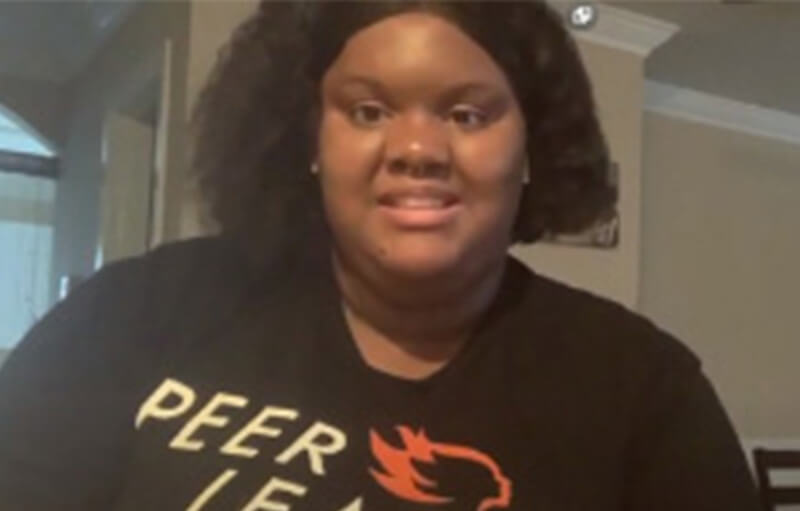
Tawana Freeman
DC Intern - Building Bridges Across the River
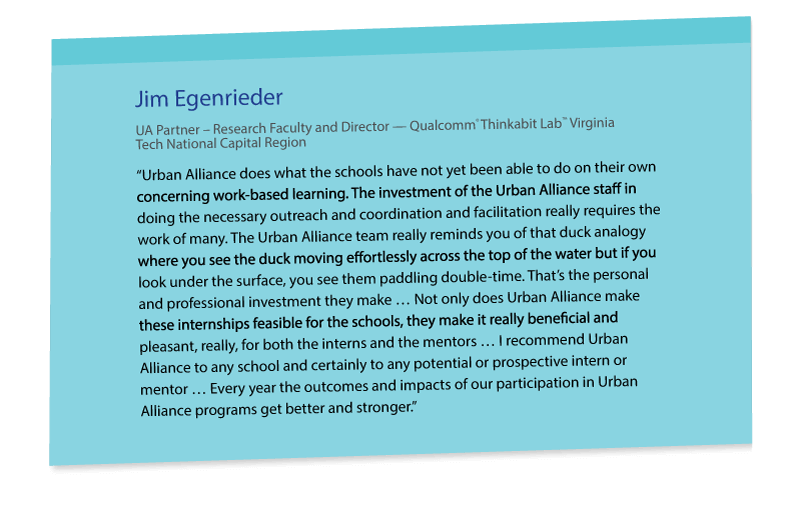
Jim Egenrieder
UA Partner – Research Faculty and Director — Qualcomm® Thinkabit Lab™ Virginia Tech National Capital Region
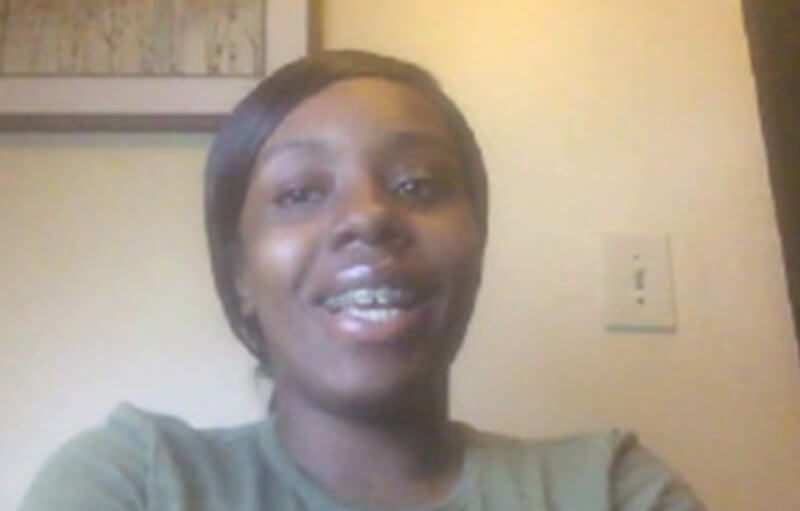
Jamaria Monroe
Detroit Intern – Quicken Loans
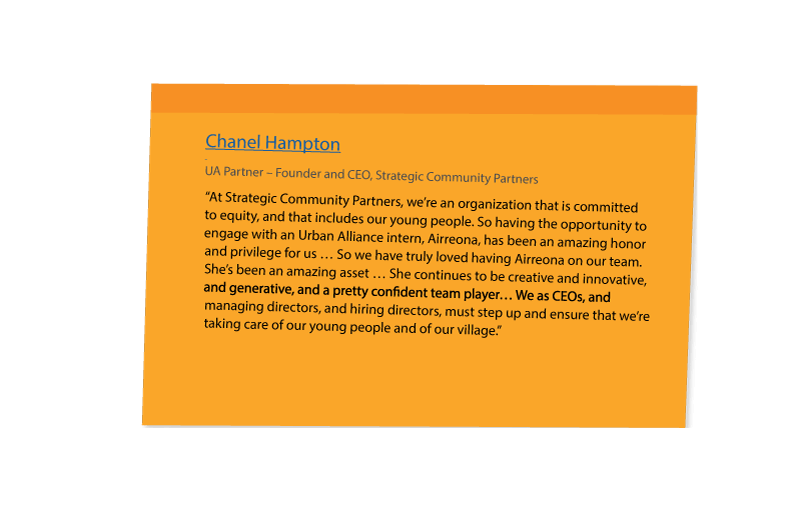
Chanel Hampton
UA Partner – Founder and CEO, Strategic Community Partners

Khairi Ross
DC (Montgomery County) Intern - Abt Associates
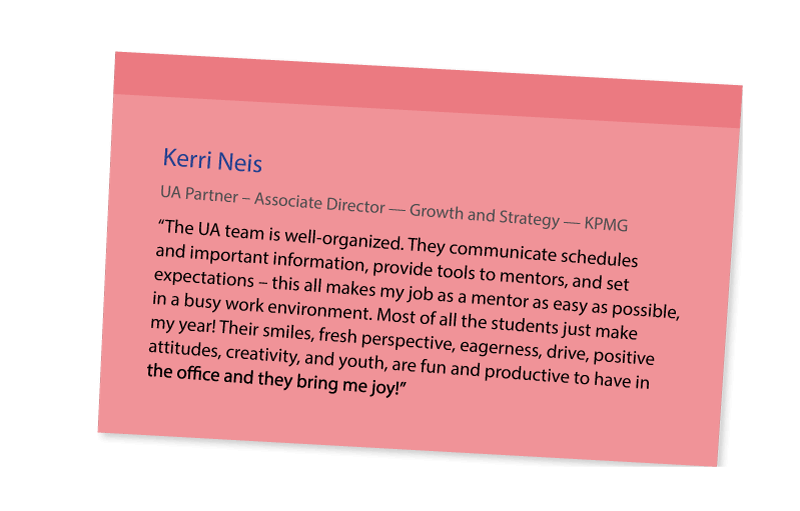
Kerri Neis
UA Partner – Associate Director — Growth and Strategy — KPMG

Tamani Abdalrasol
Northern Virginia Intern - United Bank
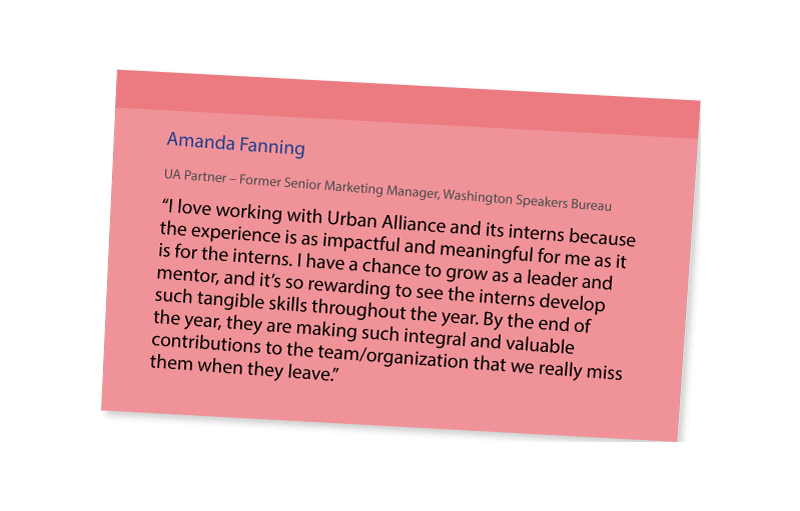
Amanda Fanning
UA Partner – Former Senior Marketing Manager, Washington Speakers Bureau

T’Maya Simmons
DC Intern - College to Congress
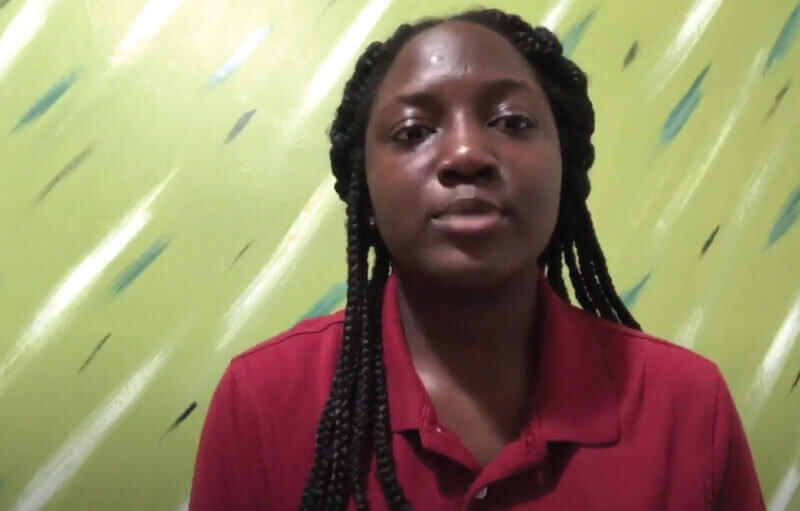
Raquel Forku
DC Intern, Katten Muchin Rosenman LLP
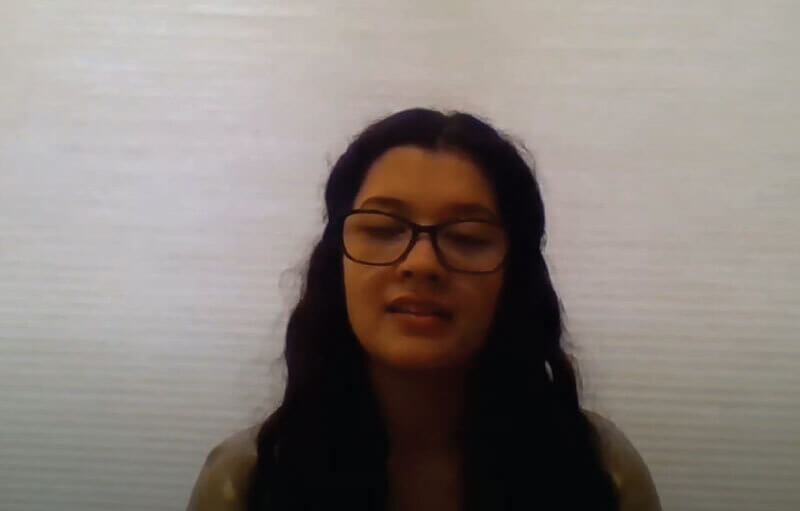
Kathryn Stanley
Northern Virginia Intern, Virginia Tech Qualcomm Thinkabit Lab
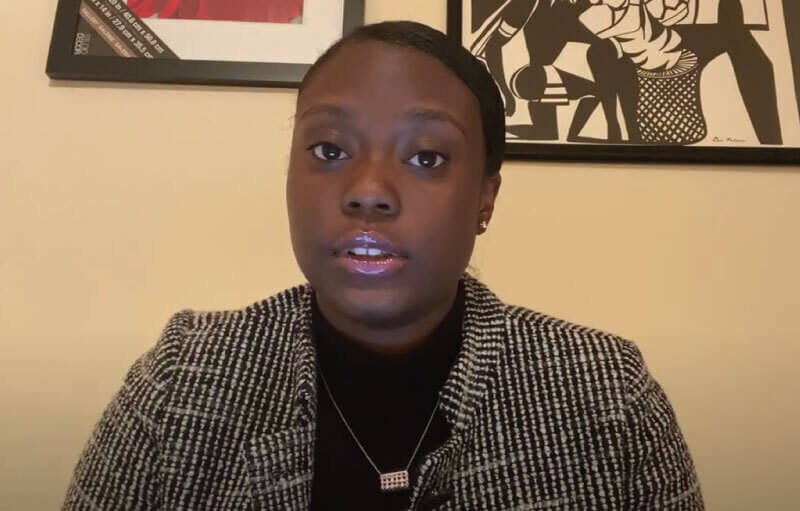
Whitney Morris
Chicago Intern, Turner Construction
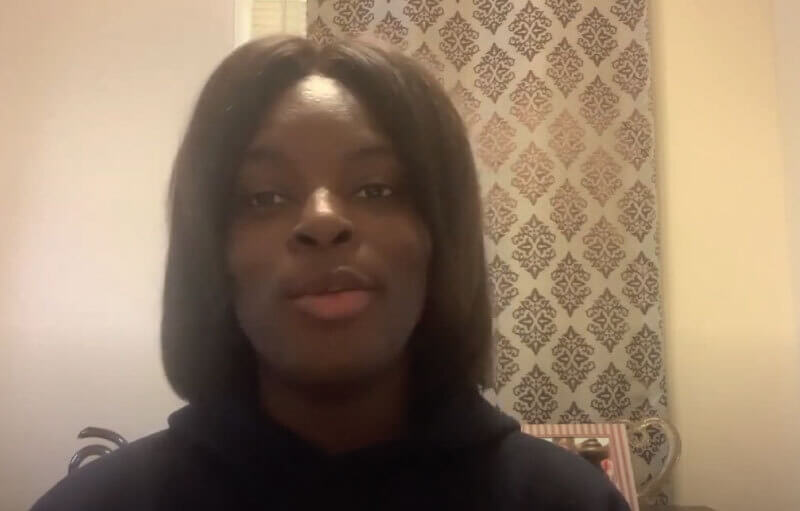
T'aela Hughes
Baltimore Intern, Enoch Pratt Free Library
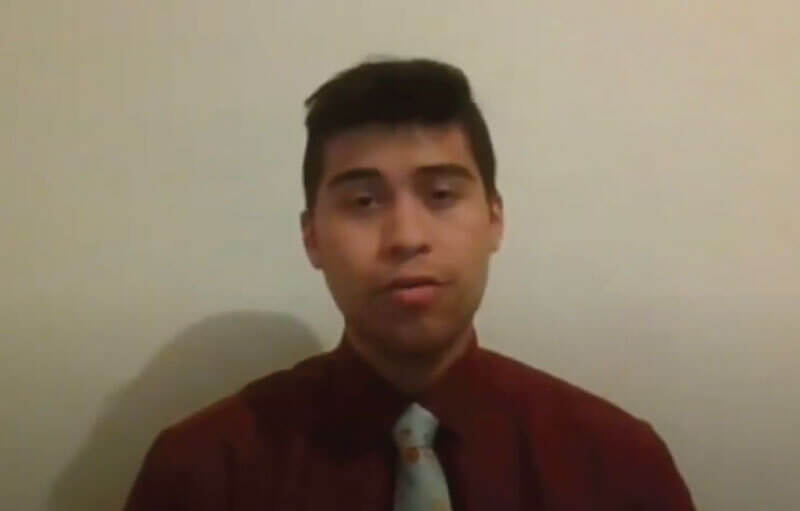
Bryan Rivera
Northern Virginia Intern, Inova Health System
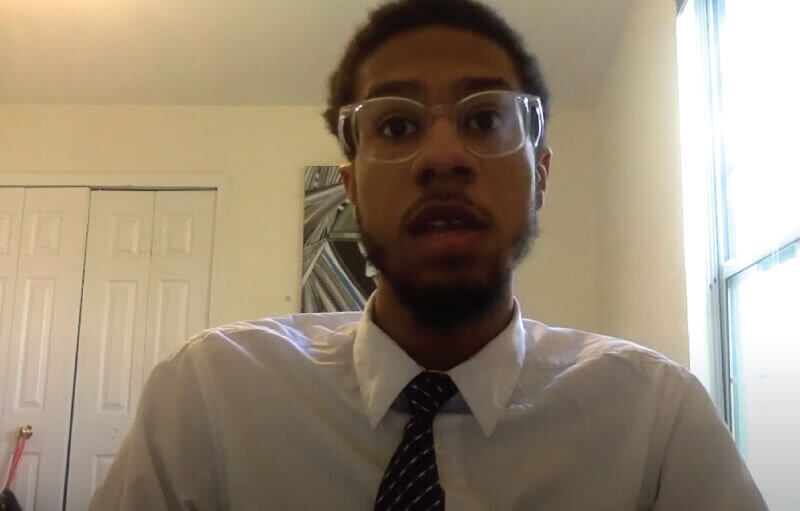
Antwaun Austin
DC Intern, Bank of America
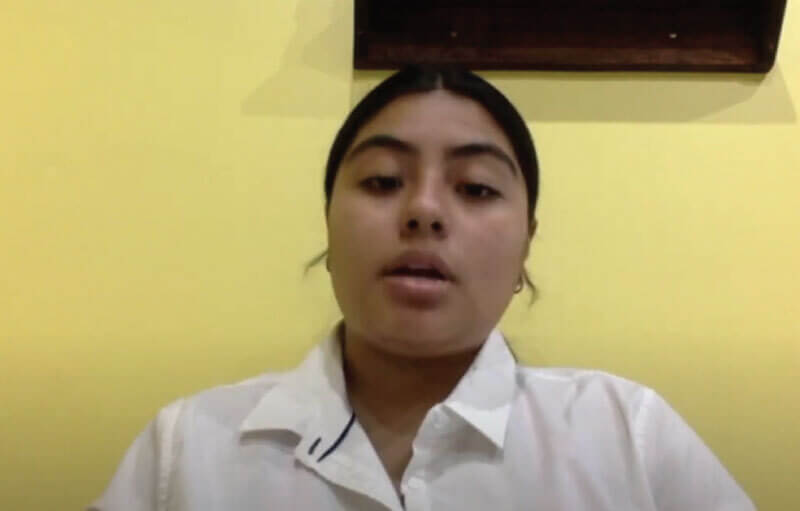
Ana Ramos
Baltimore Intern, The Cordish Companies




THANK YOU TO OUR GENEROUS DONORS
All donations and grants over $500 received September 1, 2019 – August 31, 2020.
INDIVIDUAL DONORS
John Allen
Daniel Bader
Joseph Baker
Peter and
Cherry Baumbusch
Michael Berman
Teresa Blanca
Nancy and Alan Bubes
Nick and Julia Carpenter
Michelle Cortright
Richard Dagen
Mary DaSilva
Gregory Desautels
Kelly Dibble
Gerrick Doss
James Egenrieder
Melanie Folstad
and Rick McUmber
Joslin Gallatin
Ryan Garino
and Seth Goldman
Zach Goldman
Donald Graham
Alessandra
and Paymon Hashemi
George Haywood
Carolyn Henderson
Karen Herron
Christopher Hibbard
Michael Kantor
and Heidi H. Schulman
Daniel Kaplan
and Kay Richman
Nicholas Kilavos
Monica Kinberg
Karen and Ethan Leder
Colleen Lee
Caroline and Jack Leslie
Josh Loyd
Alfred Luce
Mary Stuart McCamy
Jennifer Mendelson
Morgan Miller
Kwasi Mitchell
Afroze Mohammed
Gary Myers
Esther Newberg
Thomas Nides
Veronica Nolan
and Kareem El-Alaily
Katryn Norman
James Pavisha
Andrew Plepler
Heather Podesta
Leslie and Ken Pucker
Karen Santiago
Mike and Liz Saric
Pam Sauber
Kristin and David Shapiro
Jere Simpson
Sarah Slusser
Eshauna Smith
Zed Smith
Scott Solomon
Wendy Sosville
Kathryn Turner
Marta Urquilla
Courtenay Valenti and Patrick Roberts
Maura and Jim Vanderzon
Jeanna Vidale
DeLinda Washington
William and Ruth Westhoff
Cliff White
Arden and Muriel Maignan Wilkins
Mitzi Williams
Tina Williams
Dan Winship
Greg Woodford
Debbie Zients
Mary and Jeff Zients
INSTITUTIONAL DONORS
ACT for Alexandria
Advanced Concepts and Technologies
International
Aegon Transamerica Foundation
Alexandria Fund for Human Services
Allstate
American Honda Foundation
Jack R. Anderson Foundation
Ariel Investments, LLC
Arlingtonians for a Clean Environment
AT&T
Baltimore Children and Youth Fund
Baltimore City Mayor’s Office of Employment Development
Baltimore Community Foundation
Baltimore’s Promise
Bank of America Charitable Foundation
Mandell and Madeleine Berman Foundation
Bernstein Management Corporation
Black Speakers Network
Henry and Ruth Blaustein Rosenberg Foundation
Bloomberg Philanthropies
Eddie C. and C. Sylvia Brown Family Foundation
Bruhn-Morris Family Foundation
The Morris and Gwendolyn Cafritz Foundation
The Annie E. Casey Foundation
Centro
Chartis Federal
Citi Foundation
City of Chicago
A. James & Alice B. Clark Foundation
The Coca-Cola Company
The Cogan Family Foundation
The Community Foundation for Northern Virginia
Constellation
The Cordish Family Foundation
Cortright Family Foundation
Crowell & Moring Foundation
Danaher Foundation
DC Department of Employment Services (DOES)
Dee Zee Group, LLC
Detroit Pistons
The Economic Club of Washington, D.C.
General Motors
Greater Washington Community Foundation
Healthcare Initiatives Foundation
Hearst Foundations
Hilton Effect Foundation
Horning Family Fund
Hyatt
Kia Motors America
KPMG
Learn24
M&T Charitable Foundation
Madison Dearborn Partners, LLC
The J. Willard & Alice S. Marriott Foundation
The Richard E. and Nancy P. Marriott Foundation
Martha’s Table
Mastercard
McMahon Solutions
MCN Build/Southway Builders
Mead Family Foundation
Eugene and Agnes E. Meyer Foundation
Microsoft
Morgan Stanley
News Corporation
NOVA ScriptsCentral
Obama Foundation
Office of Out of School Time Grants and Youth
Outcomes
Polk Bros. Foundation
Pritzker Foundation
Pritzker Pucker Family Foundation
Pritzker Traubert Family Foundation
Rotary Club of Alexandria
Edward and Jennifer Magnus Schwab Charitable
Fund
Share Fund
Skillman Foundation
Southwest Airlines
SRC Inc
Hattie M. Strong Foundation
Truist Charitable Fund
Turner Construction Company Foundation
United States Department of Education
United Way National Capital Area
Venture Philanthropy Partners (VPP)
Verizon Foundation
The Harry and Jeanette Weinberg Foundation
Wells Fargo Foundation
Westhoff Family Foundation
World Bank Group
Zegar Family Foundation
NATIONAL BOARD OF DIRECTORS
NATIONAL BOARD OF DIRECTORS
STAFF
STAFF
NATIONAL BOARD OF DIRECTORS
Mary Menell Zients
Board Chair and Co-Founder, Urban Alliance
Andrew Plepler
Vice Chair of the Board and Co-Founder, Urban Alliance; Global Head of ESG, Bank of America
Gregory Desautels
Managing Vice President of Strategy, Capital One
Kelly Dibble
Senior Vice President and Director of Public Affairs & Government Relations, Northern Trust
Kevin Greer
Partner, New Profit
Christine Gregory
Former Executive Director, Urban Alliance; Chief Operating Officer, NAACP Legal Defense Fund
Nick Kilavos
Managing Director, Asset Management, AlliancePartners LLC
Karen Leder
Volunteer
Kwasi Mitchell
Treasurer of the Board, Urban Alliance; Principal, Deloitte Consulting LLP
Tom Nides
Managing Director and Vice Chairman, Morgan Stanley
Veronica Nolan
Former CEO, Urban Alliance; Board Member, Alexandria City Public Schools; CEO/Managing Partner at Illumascent Strategies
Shahin Rezai
Retired; Former Senior Vice President, Chief Counsel, Transactions, Securities
and Finance at Capital One
Zed Smith
Chief Operating Officer, The Cordish Companies
Marta Urquilla
President, Centri Tech Foundation
Jeanna Vidale
Director of Human Resources, Georgetown Day School
DeLinda Washington
Vice President, Human Resources, Kaiser Permanente
Jeffrey Zients
Board Member Emeritus and Co-Founder, Urban Alliance; CEO, The Cranemere Group
STAFF
NATIONAL
Eshauna Smith
CEO
Nicole Clegg
Human Resources Manager
Sandra Cole
Finance Director
Nicola Diamond
Chief Operating Officer
Julie Farkas
Chief Strategic Growth Officer
Katie Graul
Director of Workforce Initiatives
Midas Hampton
Research and Program Analyst
Kiara Holland
Business and Finance Associate
Julia Kent
Chief Development Officer
Dee Komo
Development Associate
Jeremy Ly
Director of Program Quality
Chiara Montecchi
Development Director
Tyran Omary
Senior Director of Programs
Paul Remy
Senior Director of Human Capital and Operations
Lauren Rice
Senior Director of Evaluation and Learning
Emily Rogers
Communications Director
Jason Rotolo
Budget and Accounting Director
Nat Singal
Donor Relations Associate
Isabella Ulloa
Managing Director
Baltimore
Nikki Brooks
Site Director
LaShonda Boldon
Program Manager
Dara Doss
Program Coordinator
Kendra Lyle
Program Coordinator
Erica Myers
Alumni Services Director
Chicago
Jenna Ketchum
Executive Director
Heather Davis
Alumni Services Director
Jennifer Dixon
Program Director
Briana Ford
Program Coordinator
Deldric Henderson
Program Manager (Obama Youth Jobs Corps)
Katie Miles
Senior Director of External Partnerships
Yoomna Rahim
Program Associate
Eileen Torpy
Dual Role Program Manager
Anna Urban
Program Coordinator
Executive Director
Detroit
Margrit Allen
Executive Director
Azhar Aboubaker
Program Coordinator
Julia Blok
Site Director
Simone Porter
Program Coordinator
Northern Virginia
Christine McCurdy
Executive Director
Lauren Landis
Program Coordinator
Stefanie Marin
Program Coordinator
Washington, DC
Monique Rizer
Executive Director
Stella Afolabi
Program Associate
Chris Allen
Program Coordinator
Demitria Flores
Program Coordinator (Suitland)
Laurentiis Gaines
Program Specialist (Montgomery County)
Alexis Hardy-Wells
Program Coordinator
Evan Metz
Director of Employer Partnerships
Laura Montgomery
Alumni Services Director
Alberto Otero
Program Coordinator